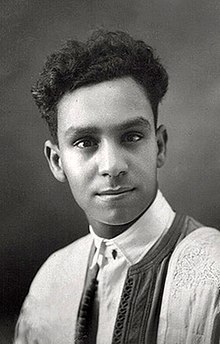music.wikisort.org - Poet
Aboul-Qacem Echebbi (Arabic: أبو القاسم الشابي, ALA-LC: Abū al-Qāsim al-Shābbī; 24 February 1909 – 9 October 1934) was a Tunisian poet. He is probably best known for writing the final two verses of the current National Anthem of Tunisia, Humat al-Hima (Defenders of the Homeland), which was originally written by the Egyptian poet Mustafa Sadik el-Rafii.
This article needs additional citations for verification. (December 2009) |
Aboul-Qacem Echebbi | |
|---|---|
أبو القاسم الشابي | |
 | |
| Born | 24 February 1909 Tozeur, Tunisia |
| Died | 9 October 1934 (aged 25) Tunis |
| Burial place | Mausoleum of Abou El Kacem Chebbi, Tozeur |
| Occupation | Poet |
Life
Echebbi was born in Tozeur, Tunisia, on 24 February 1909, the son of a judge. He obtained his attatoui diploma (the equivalent of the baccalauréat) in 1928. In 1930, he obtained a law diploma from the University of Ez-Zitouna. The same year, he married and subsequently had two sons, Mohamed Sadok, who became a colonel in the Tunisian army, and Jelal, who later became an engineer.
He was very interested in modern literature in particular, and translated romantic literature, as well as old Arab literature. His poetic talent manifested itself at an early age and this poetry covered numerous topics, from the description of nature to patriotism. His poems appeared in the most prestigious Tunisian and Middle-Eastern reviews. His poem To the tyrants of the world became a popular slogan chant during the 2011 Tunisian and subsequently Egyptian demonstrations.[1]

Echebbi died on 9 October 1934 at the current Habib-Thameur Hospital in Tunis, (formerly "Italian Hospital"), following a long history of cardiac disorders (Myocarditis). His portrait is on the current 10 DT note. Echebbi was considered by later Egyptian literary critic Shawqi Daif to be among the very finest Arabic poets of the modern era.[2]
In late 2010 and 2011, Echebbi's poems became a source of inspiration for Arab protestors during the revolutions of the Arab Spring, which began with the Jasmine revolution in Tunisia.[3] Since then, there has been a revived interest in his work and his biography.[4]
Echabbi was buried in hometown Tozeur, Tunisia. His mausoleum is opened for visitors where they can visit his tomb.
Works
- Ilā Ṭuġāt al-Ɛālam (To the tyrants of the world)
- Aġānī al-Ḥayāt (canticles of the life)
- Muđakkarāt (Memories)
- Rasā'il (A collection of letters)
- Ṣadīqī (A collection of seminars given to the Alumni Association of the college; caused quite a lot of controversy among conservative literary groups)
See also
- Al-Tijani Yusuf Bashir, a Sudanese contemporary of Echebbi who also died at the age of 25
References
- All Things Considered (2011-01-30). "Tunisian Poet's Verses Inspire Arab Protesters". NPR. Retrieved 2012-02-14.
- Journal of the Middle East, vols. 4-6. Cairo: Markaz Buḥūth al-Sharq al-Awsaṭ of Ain Shams University, 1979.
- Mohamed-Salah Omri, Tunisia's revolution of dignity and freedom cannot be colour-coded, Academia.edu
- Mohamed-Salah Omri, al Shabbi, Abu al Qasim, Academia.edu
External links
- (in Arabic) Aboul-Qacem Echebbi Website Archived 2019-05-30 at the Wayback Machine
- Website
На других языках
- [en] Aboul-Qacem Echebbi
[es] Abou el Kacem Chebbi
Abu-l-Qasim as-Xabbat o, en su transcripción francesa Abou el Kacem Chebbi (1909-1934) (en árabe: أبو القاسم الشابي, Abū l-Qasim ax-Xabbat), fue un poeta tunecino nacido en 1909 en Tozeur. Fue el artista que cambió la poesía tunecina y dio una nueva orientación a la poesía árabe contemporánea. Fue un poeta vanguardista, a pesar de la influencia romántica y el peso de la tradición. Incitaba a la acción contra la incultura y la intolerancia, a pesar de su lirismo melancólico. Es considerado el poeta de la libertad de Túnez.[fr] Abou el Kacem Chebbi
Abou el Kacem Chebbi (arabe : أبو القاسم الشابي), également orthographié Aboul Kacem Chabbi ou Aboul-Qacem Echebbi, né probablement le 24 février 1909 à Tozeur et mort le 9 octobre 1934 à Tunis, est un poète tunisien d'expression arabe considéré par Abderrazak Cheraït comme le poète national de Tunisie[1].[ru] Абу-ль-Касим аш-Шабби
Абу́ль-Ка́сим аш-Ша́бби (Абу эль-Касем Шебби, араб. أبو القاسم الشابي, фр. Abou el Kacem Chebbi; 24 февраля 1909, деревня Шаббия, вблизи Таузара — 9 октября 1934, Тунис) — тунисский поэт, один из классиков литературы современного Туниса. Входит в число первых романтиков арабской поэзии. Самую большую известность получил благодаря сочинению двух последних стихов Тунисского гимна (Хумат аль-Хима — «Защитники Отечества»), первоначально написанного египетским поэтом Мустафой Садиком ар-Рафии (англ.) (рус..Другой контент может иметь иную лицензию. Перед использованием материалов сайта WikiSort.org внимательно изучите правила лицензирования конкретных элементов наполнения сайта.
WikiSort.org - проект по пересортировке и дополнению контента Википедии